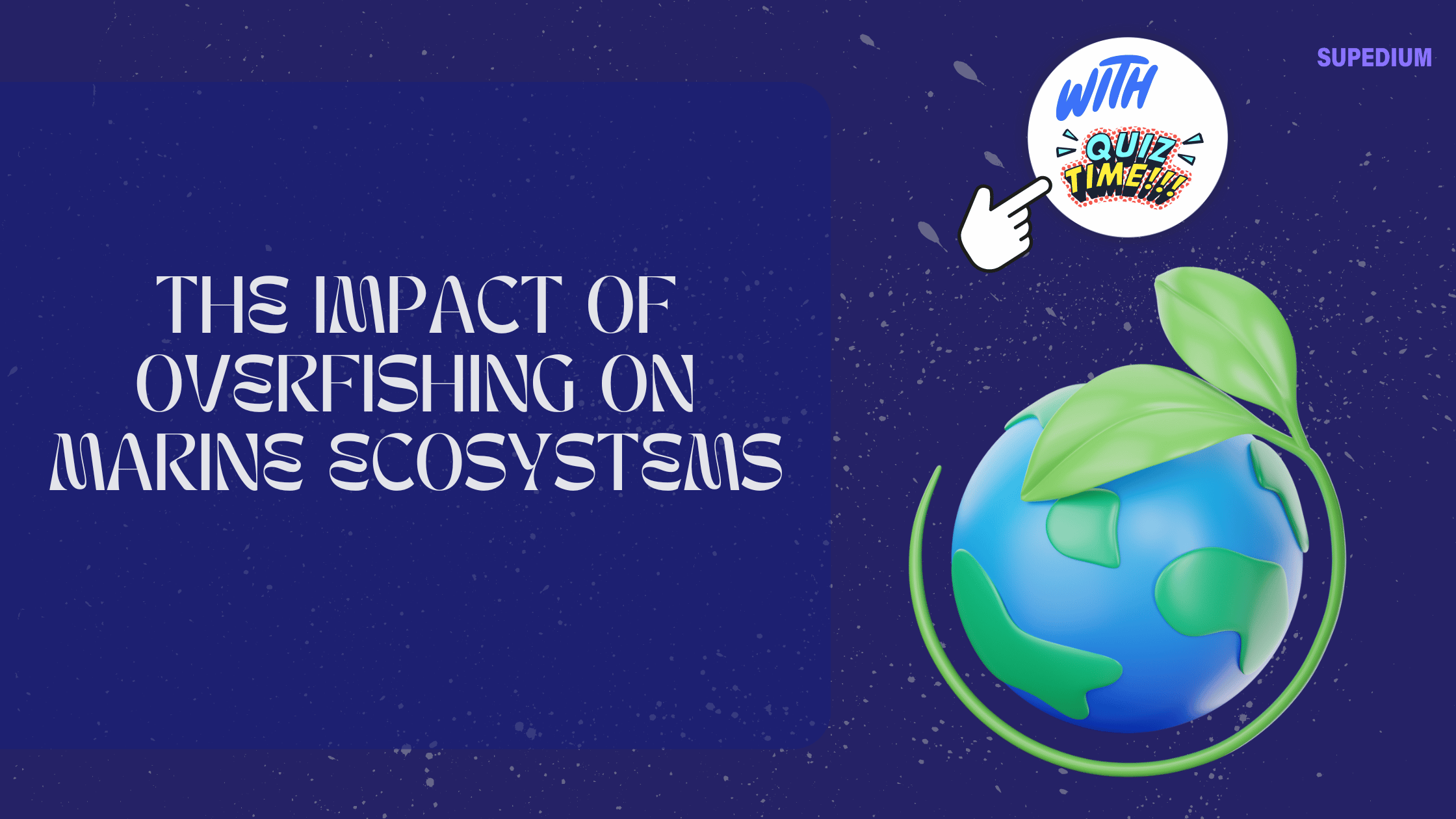Table of Contents
![]()
Overfishing represents a critical threat to the health of marine ecosystems worldwide. It occurs when fish and other marine species are harvested at a rate faster than they can reproduce, leading to the depletion of fish stocks and widespread ecological consequences. Understanding the impact of overfishing on marine ecosystems is crucial for developing effective conservation strategies and ensuring the sustainability of our oceans.
Overview of Overfishing
Definition of Overfishing
Overfishing refers to the practice of catching fish and other marine organisms at a rate that exceeds their natural reproductive capacity. This unsustainable fishing practice results in a decline in fish populations and disrupts the balance of marine ecosystems. Unlike sustainable fishing, which aims to harvest resources at a rate that allows for natural replenishment, overfishing leads to the degradation of marine environments and the loss of biodiversity.
Historical Context
The evolution of fishing practices has significantly impacted marine ecosystems. Historically, fishing was conducted on a small scale, with limited technology and local impacts. However, with advancements in technology and increased demand for seafood, commercial fishing expanded rapidly. Key milestones, such as the development of industrial trawlers and longliners, have allowed for more efficient and extensive fishing operations, often leading to overexploitation of marine resources.
Current Statistics
As of recent reports, a significant portion of global fish stocks are classified as overexploited or depleted. According to the Food and Agriculture Organization (FAO), around 34% of global fish stocks are currently overfished, and many others are approaching critical levels. This trend reflects the increasing intensity of fishing practices and the challenges of managing fish populations in a sustainable manner.
Effects of Overfishing on Marine Ecosystems
Depletion of Fish Populations
One of the most direct effects of overfishing is the depletion of target fish species. For example, the cod fisheries in the North Atlantic have experienced severe declines due to overfishing. Historically abundant, cod populations have been reduced to a fraction of their former levels, impacting both the species and the communities dependent on them. The depletion of key species can have cascading effects throughout the marine food web, altering the dynamics of entire ecosystems.
Bycatch and Its Consequences
Bycatch refers to the capture of non-target species during fishing operations. This includes a wide range of marine organisms, such as dolphins, sea turtles, and juvenile fish, which are often discarded dead or dying. Bycatch not only reduces the populations of these non-target species but also disrupts marine ecosystems by affecting predator-prey relationships and altering species composition. For instance, the decline of sea turtles due to bycatch has consequences for marine ecosystems, as turtles play important roles in maintaining the balance of seagrass beds and coral reefs.
Habitat Destruction
Certain fishing methods, such as bottom trawling, have devastating effects on marine habitats. Bottom trawling involves dragging heavy nets across the sea floor, which can destroy coral reefs, seagrass beds, and mangrove forests. These habitats are critical for the life cycles of many marine species, providing breeding grounds, shelter, and food sources. The destruction of these habitats reduces biodiversity and impairs the ecological functions they provide, such as carbon sequestration and coastal protection.
Disruption of Food Chains and Ecosystem Dynamics
Overfishing can lead to disruptions in marine food chains and ecosystem dynamics. The removal of key predator species, such as sharks, can result in an overpopulation of prey species and subsequent shifts in the structure of marine communities. For example, the decline of shark populations has been linked to increases in the numbers of smaller fish and invertebrates, which can affect the health of coral reefs and other marine habitats.
Consequences of Overfishing
Economic Impact
Overfishing has significant economic consequences, particularly for communities dependent on fisheries. As fish stocks decline, the productivity of fisheries decreases, leading to reduced catches and income for fishermen. This economic instability can impact livelihoods and result in increased poverty in coastal communities. Additionally, the depletion of fish stocks can affect global seafood markets, driving up prices and reducing availability.
Environmental Impact
The environmental impact of overfishing is profound, with declines in marine biodiversity and alterations to ecosystem functions. Overfished species can take decades or longer to recover, and the loss of biodiversity can reduce the resilience of marine ecosystems to other stressors, such as climate change. The degradation of marine habitats also impairs their ability to provide essential services, such as supporting fisheries and protecting coastlines from erosion.
Social and Cultural Impact
Overfishing also affects the social and cultural fabric of coastal communities. Many indigenous and local fishing communities have deep cultural ties to the ocean and rely on traditional fishing practices for sustenance and identity. The decline of fish stocks can lead to the erosion of cultural practices and traditional knowledge, as well as social conflicts over dwindling resources.
Mitigation Strategies
Sustainable Fishing Practices
Sustainable fishing practices aim to balance the need for seafood with the preservation of marine ecosystems. This includes measures such as implementing catch limits, quotas, and seasonal closures to allow fish populations to recover. Sustainable practices also involve reducing bycatch through the use of selective fishing gear and methods. Promoting sustainable seafood choices among consumers can further support the transition to more responsible fishing practices.
Marine Protected Areas (MPAs)
Marine Protected Areas (MPAs) are designated regions where human activities are regulated to protect marine ecosystems and biodiversity. MPAs can provide refuge for overexploited species, help restore habitats, and promote the recovery of fish populations. Successful examples of MPAs include the Great Barrier Reef Marine Park in Australia and the Papahānaumokuākea Marine National Monument in the United States. These areas demonstrate the potential for MPAs to contribute to marine conservation and sustainable fisheries.
International Agreements and Policies
International cooperation is essential for managing fish stocks and addressing overfishing on a global scale. Key treaties and agreements, such as the United Nations Fish Stocks Agreement and the Convention on the Law of the Sea, provide frameworks for international collaboration and governance of marine resources. Effective implementation and enforcement of these agreements are crucial for their success.
Technological Innovations
Advancements in technology offer opportunities to mitigate the impacts of overfishing. Innovations such as satellite tracking, electronic monitoring, and more selective fishing gear can improve the management and sustainability of fisheries. Enhanced monitoring and enforcement capabilities also play a vital role in ensuring compliance with fishing regulations and preventing illegal fishing activities.
Case Studies
Success Stories
There are notable examples of successful efforts to manage overfishing and restore marine ecosystems. The recovery of the Atlantic cod fishery in parts of Canada, following the implementation of strict catch limits and fishing bans, illustrates the potential for effective management strategies. Similarly, the establishment of MPAs in the Galápagos Islands has led to significant improvements in marine biodiversity and ecosystem health.
Areas of Ongoing Challenge
Despite progress in some areas, overfishing remains a significant challenge in many regions. The West African fisheries, for example, continue to face issues related to illegal fishing and overexploitation. Addressing these ongoing challenges requires sustained efforts, improved governance, and increased support for conservation initiatives.
Future Outlook
Predicted Trends in Marine Ecosystem Health
Looking ahead, the health of marine ecosystems will be influenced by a range of factors, including climate change, habitat loss, and overfishing. Projections indicate that if current trends continue, many fish stocks may face further declines, and marine biodiversity could be significantly reduced. However, proactive measures and effective management strategies offer hope for reversing these trends and promoting the recovery of marine ecosystems.
Emerging Solutions and Research
Ongoing research and innovation are crucial for addressing the challenges of overfishing. Emerging solutions, such as ecosystem-based management approaches and advancements in aquaculture, hold promise for supporting sustainable fisheries and marine conservation. Continued investment in science, policy, and community engagement will be essential for achieving long-term sustainability in marine ecosystems.
Conclusion
Overfishing poses a serious threat to marine ecosystems, with far-reaching consequences for biodiversity, economies, and communities. Addressing this issue requires a multifaceted approach, including the adoption of sustainable fishing practices, the establishment of marine protected areas, and international cooperation. By taking concerted action and supporting innovative solutions, we can work towards a future where marine ecosystems are healthy, resilient, and able to support both human and ecological needs.






Be the first to comment